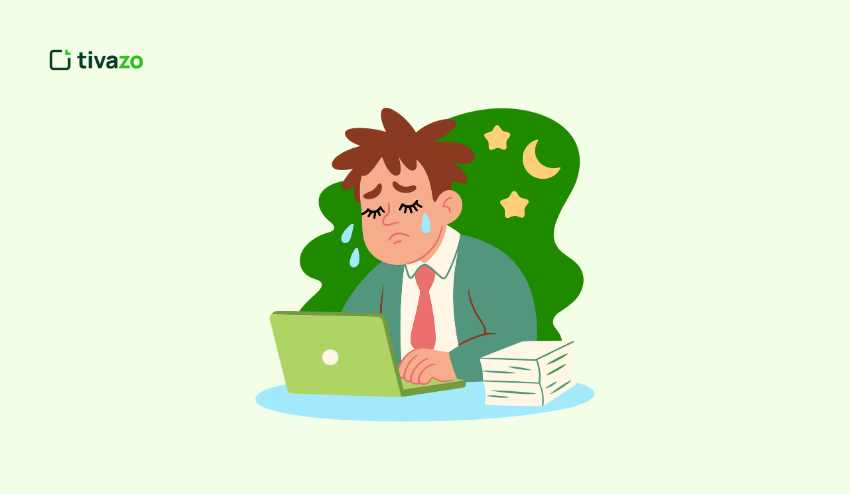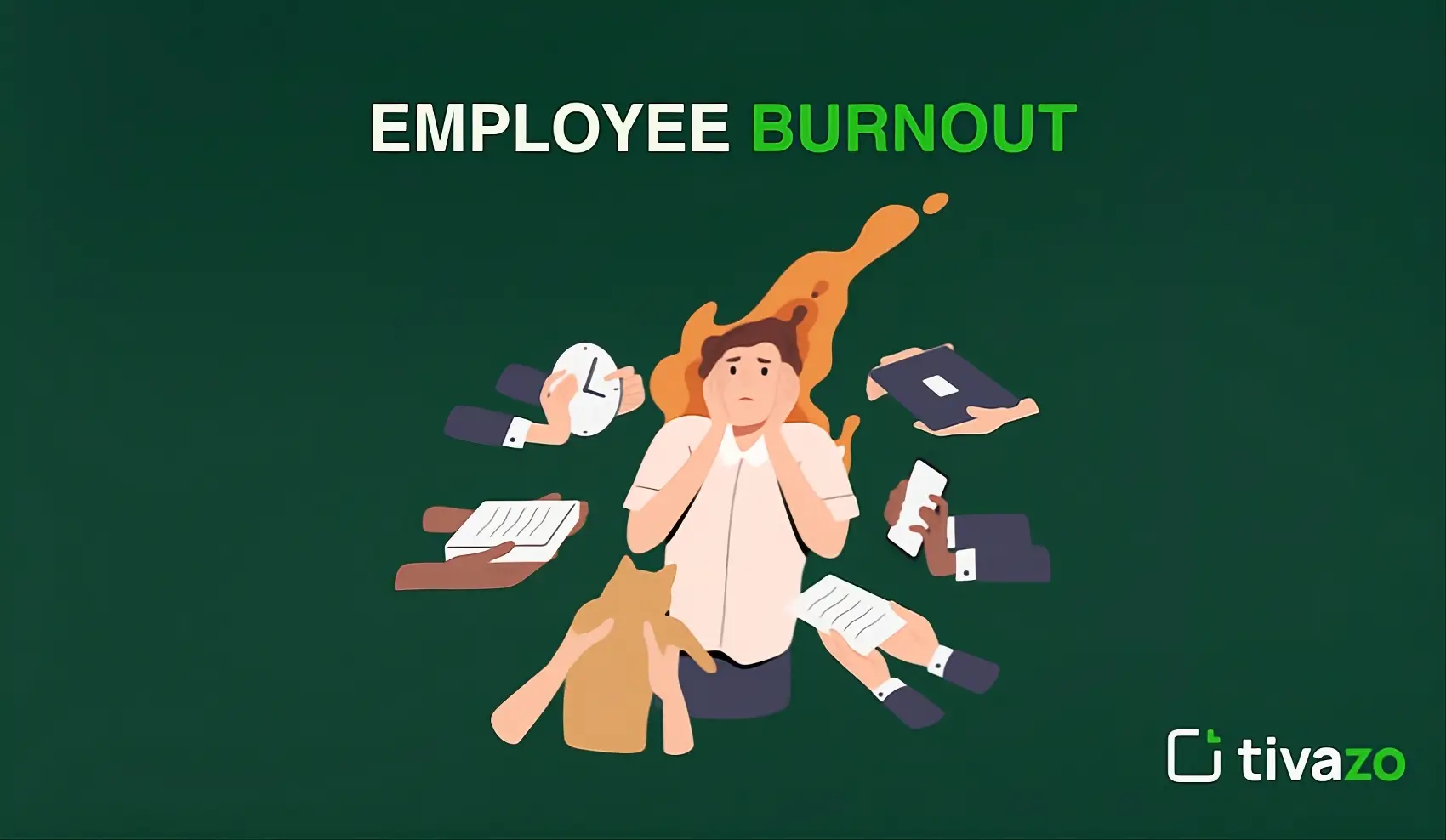Managing emotions at work is not only about eliminating emotional outbursts but it is also about how you recognize, control and utilize your emotions in a manner that brings growth and success at work. All professionals, both at the low level of the hierarchy and senior executives, have to encounter problematic situations that might cause emotional reactions. It could be a case of stress or frustration or pressure but in whatever the case, our approach to handling our emotions has a direct impact on our productivity, team relationship and even our health.
This is a guide that we would like to share with you regarding 5 effective methods of managing emotions at work, so that you could avoid stress, remain productive, and succeed in your career. These tricks will not only assist you to deal with the emotions but also use them to improve your emotional intelligence, as well as build a good work environment.
Key Highlights:
- Why Managing Emotions at Work is Crucial
- Proven Tips to Master Managing Emotions at Work
- Regulate Emotions While at Work
- Developing Emotional Intelligence for Long-Term Success
- Stop Being So Sensitive and Emotional at Work
- Long-Term Strategies for Emotional Regulation
- Seek Professional Help for Emotional Challenges at Work
Why Managing Emotions at Work is Crucial
Managing emotions at work is very necessary for personal performance and the general health of the organization. It enhances efficiency, minimizes stress and helps to build a healthy relationship in the working environment. Research has demonstrated that individuals who possess greater levels of emotional intelligence are 58 percent more successful in dealing with stress and coping with workplace stressors.
The lack of emotional control may result in impulsive reactions, miscommunication, and poor work conditions. The ability to handle emotions is a useful practice that helps employees to remain focused, work more effectively, and help to create a more harmonious work environment.
5 Proven Tips to Master Managing Emotions at Work

Tip 1: Pause and Breathe
Take a short break and try some breathing techniques of deep breathing, e.g., box breathing (inhale 4, hold 4, exhale 4, hold 4). This is to make your nervous system calm down and re-establish your emotions before losing your head.
- Reestablish emotional state: The deep breathing decreases immediate emotional responses.
- Relaxes the nervous system: Assists in getting rid of stress and anxiety at the same time.
- Simple and straightforward: Can be performed in any place at any time to provide immediate relief..
Tip 2: Take a Break
Short breaks during the day can also help a lot in decreasing the emotional load. It can be a 5-minute walk or even a few minutes of stretching; these little breaks make you get back to business with a better attitude. Can also use techniques like the Pomodoro technique.
- Shake your head: A break can be used to relax and get out of stress, which boosts productivity.
- Calm down on emotions: Taking emotional stress off by stepping out of a stressful situation allows you to cool down.
- Enhances creativity: Frequent rest boosts the total attention and creativity..
Tip 3: Gain Objective Distance
Once the emotions start to increase, it is worth stepping out of the situation. See it as a neutral person, such as an outsider, would see it and decrease emotional bias and make more rational decisions.
- Look at it in the broad picture: When you do that, it makes sense to evaluate situations more rationally.
- Lessen emotional bias: Can assist you in making objective choices, which results in better outcomes.
- Develop emotional strengthening: Nurtures a feeling of emotional composure whenever faced with difficulty..
Tip 4: Limit Multitasking
Focus on one task at a time. Multitasking may cause clutter in the mind and emotional burnout. Once you focus on doing one thing, you will have an easy time managing emotions at work and being focused.
- Improved emotional control: Stress is lower when more attention is paid to a single task.
- Efficiency: Tasks can be done one after another, and it results in an increased efficiency level.
- Reduced overwhelm: There are fewer multiple actions, and this translates to the absence of many emotional stimuli in the workplace.
Tip 5: Practice Mindfulness
The practice of regular mindfulness activities, meditation included, will help you stay mindful and monitor the level of your emotions. Emotional regulation is more possible due to this awareness, even in stressful situations.
- Meditate to be emotionally present: Mindfulness teaches you how to be both aware and non-judgmental of your feelings.
- Lessens stress: Mindfulness reduces the levels of cortisol, which decreases anxiety.
- Increases emotional resilience: Mindfulness expands emotional background with time, leading to a rise in overall emotional well-being.
How to Regulate Emotions While at Work
Steps to Regulate Emotions While at Work are:
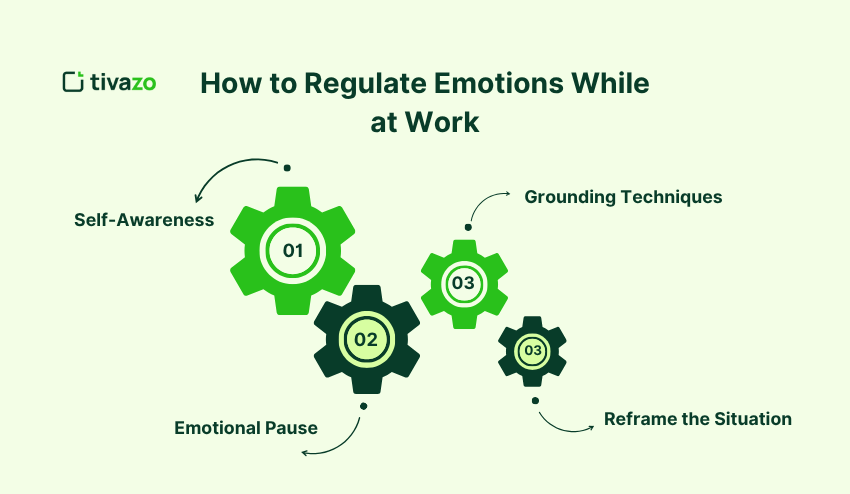
Step 1: Self-Awareness
The initial stage of emotion management is to become conscious of the causes of emotions. Consider those circumstances that make you go over the edge and why. Emotional regulation consists in self-understanding. Frequent consideration of emotional stimulators is an effective way of dealing with work emotions by becoming more aware of your reactions. This process will make you avoid losing your temper when in difficult situations.
Step 2: Emotional Pause
When you are angry, challenged or upset, you need to pause and breathe in a couple of seconds. This interval gives you time to emotionally digest what is happening. Emotional pauses are also a method of staying calm in situations of high stress, so when you are in a difficult moment, you do not let your feelings and emotions engage your work and personal relationships.
Step 3: Grounding Techniques
Apply grounding strategies such as deep breathing or paying attention to the environment to get your emotional situation to a neutral point. This will make you get into your senses. Practicing grounding methods will help you better manage emotions at work, making the workplace a better and more in-control mood. This way you are guaranteed that you can be level-headed in a stressful situation and increase your level of emotional well-being.
Step 4: Reframe the Situation
It is wonderful to change your attitude of view. A stressful situation may in many cases be re-defined as a chance to experience growth and development. Reframing is one way to direct you to be emotionally resilient by reframing your understanding of challenges as opportunities instead of threats. This cognitive change is critical to success in the long run in terms of managing emotions at work, particularly where one has to operate in harsh working conditions.
Developing Emotional Intelligence for Long-Term Success
Emotional Intelligence (EI) is the skill of recognizing, deciphering and controlling your personal feelings and those of other people. It is a must towards a successful life career. Managing emotions at work is a skill that involves self-awareness as well as the capacity to manipulate the feelings of other people in a positive way.
1. Self-Regulation:
Get to manage your responses even under challenging circumstances. This ability will decrease stress and increase your performance at times of pressure. Self-regulation will enable you to remain calm even when situations are stressful, which is much better than depending on your emotions to handle stress in the workplace; therefore, it will greatly enhance your emotional regulation at work.
2. Empathy:
Get to know more about the emotions of your colleagues. This helps in improving communication and ensuring cohesiveness within the teams. Empathy is important in managing emotions at work since it enables one to put himself in the position of others and develops confidence in groups, which improves cooperation.
3. Relationship Management:
Develop healthy and supportive relationships with co-workers. The direct relationship between Emotional Intelligence and better conflict resolution and teamwork. Proper management of relationship fosters a free supporting environment where employees feel listened and appreciated thus leading to a more healthy and productive working environment.
How to Stop Being So Sensitive and Emotional at Work
Sensitivity is not necessarily a weakness, and, on the contrary, it is a sign of high level of emotional awareness. Nevertheless, in the cases when feelings are overwhelming, one should know how to deal with them.
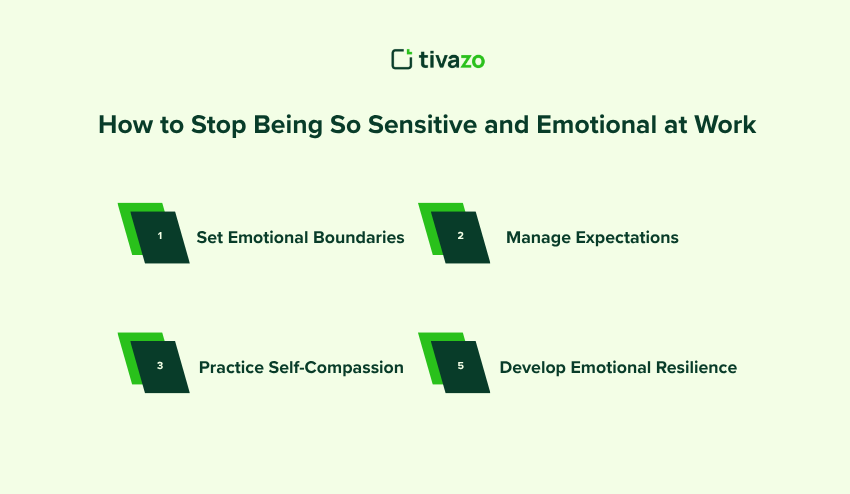
Tip 1: Set Emotional Boundaries
Be rival to establish emotional boundaries with other employees and work. Learn to say no, and guard your emotions. The boundaries will help to handle emotions more efficiently in the workplace and prevent burnout. It is also easy to deal with emotions in the workplace, when you take care of your mental health and understand your boundaries.
Tip 2: Manage Expectations
Keep you expectations in line with reality. Intrinsic unrealistic expectations may bring about emotional overwhelm and frustration. Concentrate on what you have control over, and release what you do not have control over. The power to handle your expectations will enhance the control of your reaction at the workplace by avoiding unnecessary stress and disappointment.
Tip 3: Practice Self-Compassion
Be kind to yourself. It is important to understand that emotions are normal as humans. It is the way you get back on your feet and forget the past when they strike. Self-compassion enables you to embrace your emotional reactions with no criticism, which is a vital aspect of having a healthy emotional reaction to work and sustaining a healthy emotional state in the long run.
Tip 4: Develop Emotional Resilience
Enhance your emotional capacity by practicing frequent self-care and emotional regulation. The ability to recover after a setback and adversity. Through building emotional strength, you become more effective in managing emotions at work since you can be relaxed even when you are undergoing stressful situations.
Creating an Emotionally Healthy Workplace Culture
Emotional awareness is the starting point to the creation of an emotionally healthy workplace. Sponsoring a working environment that recognizes and encourages emotional health positively influences productivity, turnover and job satisfaction.
- Training Programs: Organisations can incorporate emotional intelligence and emotional regulation training in order to promote the well-being of the employees.
- Workplace Wellness Initiatives: Organizations are encouraged to provide such programs as mental health days, stress management programs, etc., to take care of the emotional health of the employees.
- Peer Support Systems: Promotion of mentorship or peer support groups can enable the employees to exchange experiences, challenges and solutions and they develop a sense of community. This emotional bonding assists in minimizing the stress and a conducive, understanding work environment is fostered.
- Recognition and Rewards Programs: Recognition of employees working hard and their emotional stability helps in motivation and enhancing employee engagement. Through recognition programs, a positive motivated workforce is created which causes minimal stress and an increase in job satisfaction.
Long-Term Strategies for Emotional Regulation
Emotional management in the workplace is a very dynamic approach that needs proactive behavior regularly. Emotional regulation does not only entail dealing with emotions here and now but also developing habits that help one in gaining emotional health. Through some tactics that encourage you to be sensitive to emotions and exercise self control, you can enhance your interactions at work and general well-being.
1. Self-Awareness:
Become aware of your emotional cues and cycles in order to be able to control your response with time. Self-awareness would enable you recognize when your feelings are on the increase and make some measures so that you can contain them before they grow. This is a basic competence of managing emotions at work.
2. Set Boundaries:
Guard your individual time by establishing distinct boundaries though not checking work emails outside the office. Boundaries will assist in avoiding emotional burnout and making sure that you have time to rejuvenate. Personal time should be prioritized to regulate the emotional state in the long term.
3. Mindfulness Practices:
Meditation or yoga sessions will remind you to keep focused and manage your emotions. Mindfulness will make you stay in the moment and feel less stressed with emotions. By practicing mindfulness regularly, you can be able to respond and not react.
4. Self-Regulation:
Keep a healthy lifestyle make sure to get adequate sleep, exercise and proper nutrition to keep the emotions under control. Emotional well-being is supported by good physical health and can therefore be easy to remain calm and focused. Emotional stability should be a regular occurrence at work, which is achieved through self-regulation.
Building a Support System at Work
Develop positive relationships with your workmates who provide emotional support. A colleague whom you trust and can talk to will assist in dealing with emotional situations that are tough to endure. Creating a favorable network of colleagues to rely on in times of stress is also a way of alleviating it and establishing a more cooperative working atmosphere.
Promote emotional health in the workplace. This encourages a conducive, productive atmosphere where employees cannot feel scared to reveal their feelings. Increased emotional openness lessens loneliness and enhances group communication, which simplifies it to overcome challenges before they deteriorate.
When to Seek Professional Help for Emotional Challenges at Work
When you are unable in managing emotions at work, there is a need to seek professional assistance. A counselor, a coach, or even a therapist can assist you in solving deeper emotional problems and even work out a long-term improvement plan.
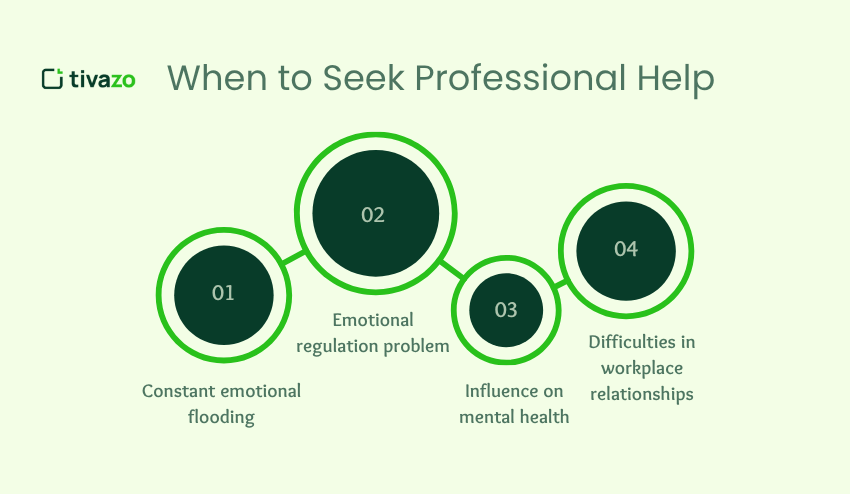
- Constant emotional flooding: When do you suspect that you are overwhelmed, stressed out, or anxious at work, and it is getting in the way of your performance, it is time to consider consulting with a professional.
- Emotional regulation problem: When your feelings are regularly difficult to control or have adverse effects in your work environment (e.g. outbursts, conflict), consulting a counselor can give you specific self-control strategies.
- Influence on mental health: In case of emotional challenges that may be hurting your general mental well-being, like in case of developing depression or anxiety, a specialist will assist in leading you to the right direction.
- Difficulties in workplace relationships: In case you have some emotional problems that cause conflict or misunderstanding with other employees, a therapist will assist you in trying to improve your communication skills and emotional intelligence.
Conclusion: Take Control of Your Emotions at Work (200-300 words)
Emotional regulation in the workplace is a continuous process that demands self-awareness, practice, and dedication. Using the 5 tips given, you can be able to manage your emotional health and make the workplace a better and healthier place. Emotional control is a good way to ease stress and also makes your relationship with your colleagues much better and this is achieved by the constant practice of emotional control.
Managing emotions at work is the center of growing professionally and personally. With these strategies, you will be in a position to face the challenges more efficiently as you proceed to implement them, stay focused and prosper in your career. It is important to remember that emotional regulation is never about holding emotions down but rather knowing them and being able to handle them to favor your success.
